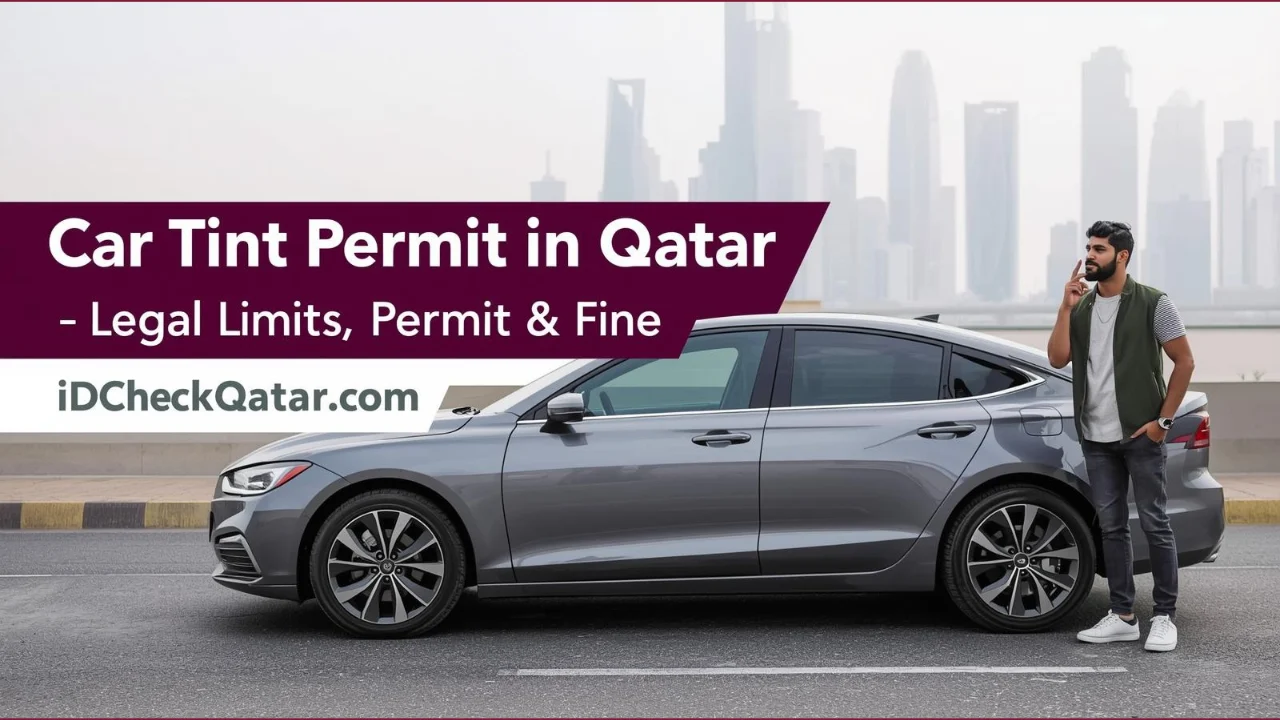Car Tint Permit in Qatar – Legal Limits, Permit & Fine
A car tint permit in Qatar allows drivers to legally exceed the standard tint limits set by the Ministry of Interior. In 2026, the law permits 20% tint on front windows and 10% on windshields, but going darker requires an official permit; violations can lead to a QAR 1,000 fine and vehicle impoundment.
Car tinting in Qatar is one of the most common modifications done by vehicle owners. While tint provides privacy and protection from the harsh sun, it is strictly regulated under Qatar’s traffic law. If you plan to tint your car, understanding the exact limits, the permit process, and the penalties for violating these limits is crucial. This guide explains everything about the car tint permit in Qatar, helping you stay compliant and avoid costly fines.
For broader details about identity verification and official requirements in the country, you can also see the Qatar ID check process. Similarly, if you are dealing with traffic-related regulations, our Qatar traffic violations guide provides an in-depth overview of penalties and rules.
Why Car Tinting Rules Exist in Qatar
Car tinting in Qatar is regulated to balance driver comfort with road safety. Dark tint may help reduce heat and glare, but excessive tinting can limit visibility for both drivers and law enforcement.
- Tint limits are set to ensure clear visibility inside vehicles.
- Regulations help in crime prevention and road accident reduction.
- The Ministry of Interior (MOI) enforces tint laws through inspections and fines.
Legal Tinting Limits in Qatar
The government has defined strict tinting percentages that are allowed without a permit.
In 2026, front windows can be tinted up to 20%, front and rear windshields up to 10%, while rear side and back windows can have darker tints, in some cases up to 100%
Here is a breakdown of permitted levels:
| Vehicle Window Part | Maximum Tint Allowed Without Permit | Notes |
|---|---|---|
| Front windshield | 10% | Must not affect visibility |
| Rear windshield | 10% | Defroster visibility must remain clear |
| Front side windows | 20% | Applies to both driver and passenger |
| Rear side windows | Up to 100% | Dark tint allowed for privacy |
| SUVs & family cars | Rear passenger area often allowed darker tints |
These limits apply to most private cars. Sports cars and special models may have stricter enforcement.
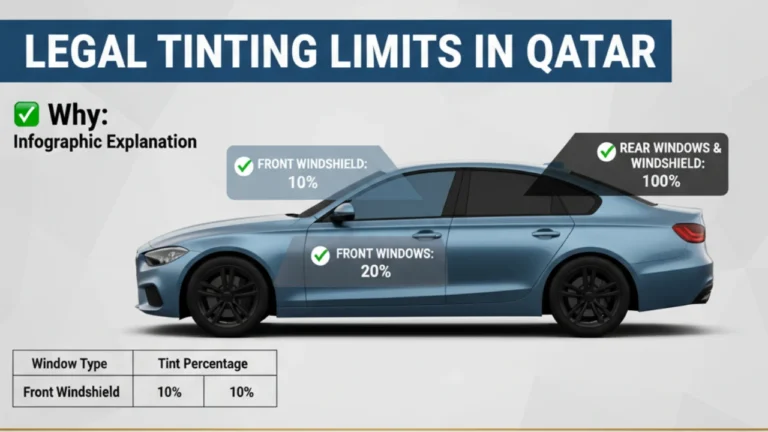
When Do You Need a Car Tint Permit?
A car tint permit is required when you want to apply a tint darker than the standard legal limit on front windshields, front side windows, or other restricted areas.
Common cases where you may need a permit:
- Medical conditions such as eye sensitivity or skin issues.
- Professional drivers who spend long hours in the sun.
- Vehicles used for transporting VIPs or for specific official functions.
Without a valid permit, applying a darker tint can result in fines and even vehicle impoundment.
How to Apply for a Car Tint Permit in Qatar
To get a car tint permit in Qatar, you must apply to the Traffic Department, usually with a valid medical report, and await written approval.
Here is the step-by-step process:
- Obtain a medical report – from a licensed hospital if you have health-related reasons for a darker tint.
- Visit the Traffic Department office – the main location is in Madinat Khalifa, but other branches may also handle requests.
- Submit your application – including your car details, Qatar ID, and medical report if required.
- Pay the applicable fee – a small fee is charged for processing and inspection.
- Receive the permit – if approved, you’ll be granted a document specifying the allowed tint percentage.
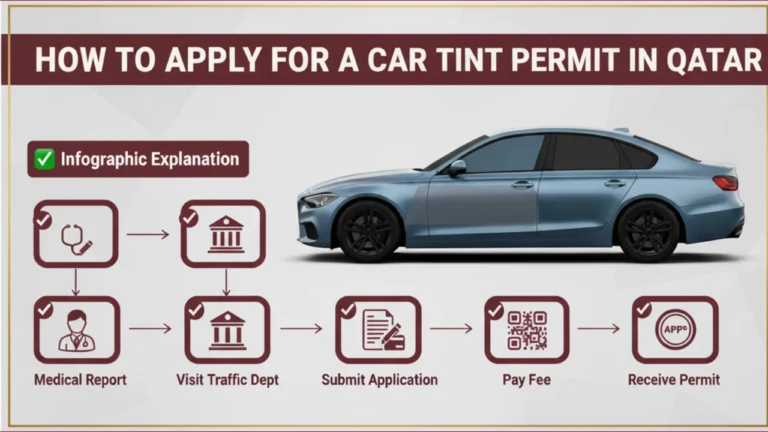
Permits are usually issued on a case-by-case basis and must be carried in your vehicle.
Car Tint Inspection During Istimara Renewal
Every year, cars in Qatar undergo istimara renewal inspections. Tint is one of the points checked.
Here is the step-by-step process:
- Tint inspection fee for cars: QAR 150.
- Tint inspection fee for motorcycles: QAR 100.
- If your tint exceeds the legal limit without a permit, your vehicle will fail inspection.
- Re-inspection is allowed once for free; further attempts may require extra payment.
Inspection centers include Al Egda, Al Mazrooa, Al Sheehaniya, Al Wakrah, and mobile stations in northern areas.
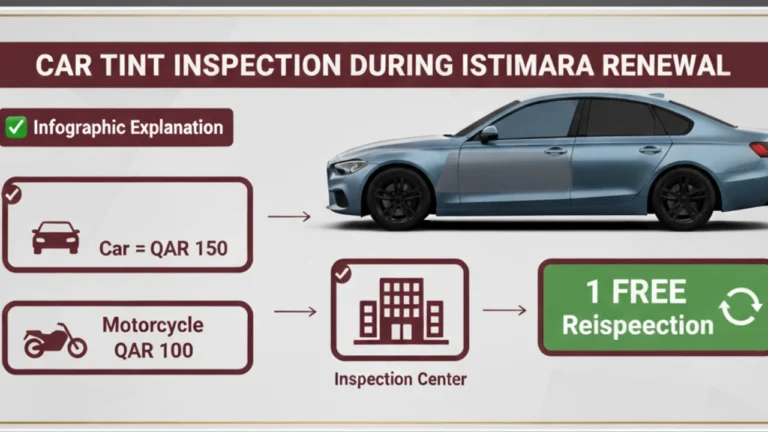
Fines and Penalties for Illegal Tinting
Illegal car tinting in Qatar can result in a fine of QAR 1,000 and possible vehicle impoundment.
If you tint your vehicle beyond the allowed limits:
- Fine amount: QAR 1,000.
- Vehicle impoundment: Police can impound the car until you remove the illegal tint.
- Inspection failure: You cannot renew your istimara until the issue is fixed.
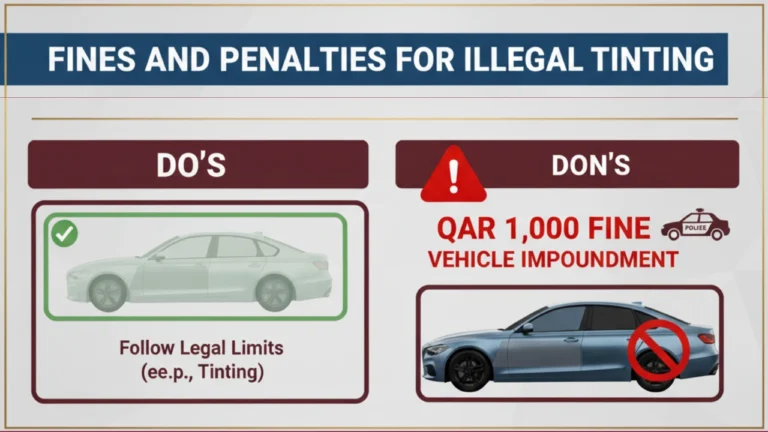
Repeated violations can also add black points to your traffic record.
Benefits of Having Legal Tint
Following the legal tinting rules helps you enjoy the benefits of tinting without risking penalties.
- Heat reduction: Essential for Qatar’s extreme summer.
- UV protection: Keeps passengers safe and protects car interiors.
- Privacy: Especially for families in SUVs and larger vehicles.
- Legal peace of mind: Avoids fines and inspection failures.
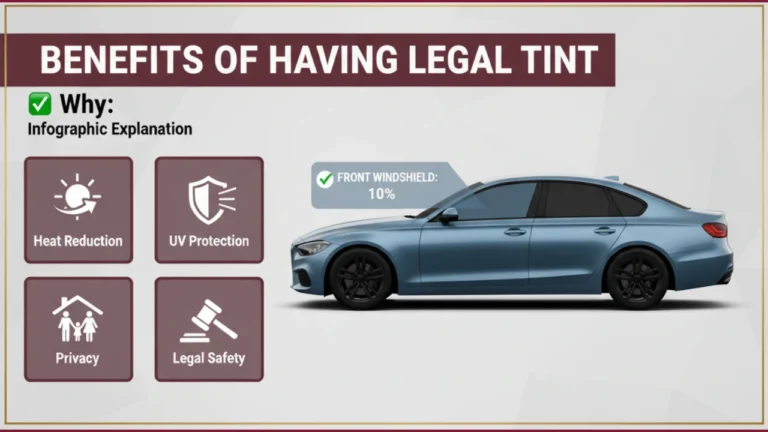
Practical Tips for Drivers
To stay compliant and avoid unnecessary trouble, here are some practical tips:
- Always confirm the percentage of tint before installing.
- Get your tint done by authorized shops familiar with Qatar’s laws.
- Keep your car tint permit in the vehicle at all times.
- Check tint levels before inspection to avoid delays in istimara renewal.
MOI Services for Car Owners
If you are applying for a car tint permit in Qatar, you may also need other Ministry of Interior services during the same process.
- Learn about checking traffic fines online to avoid penalties before renewal.
- If your car has accumulated black points, see how to remove black points in Qatar.
- For a complete overview of traffic rules, our guide on traffic rules in Qatar provides updated 2026 regulations.
These links strengthen your knowledge and help maintain compliance with Qatar’s strict traffic system.
FAQs – Car Tint Permit in Qatar
Final Thoughts
Getting a car tint permit in Qatar is not complicated, but it requires careful attention to MOI rules. Always remember that front windows and windshields have strict limits, while rear windows allow more flexibility. If you need darker tint due to medical or personal reasons, applying for a permit through the Traffic Department is the safest path.
By following the regulations, you avoid fines, inspection delays, and potential black points. More importantly, you enjoy the real benefits of tinting like cooler interiors, UV protection, and privacy, all while staying compliant with Qatar’s traffic laws.

